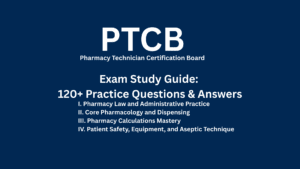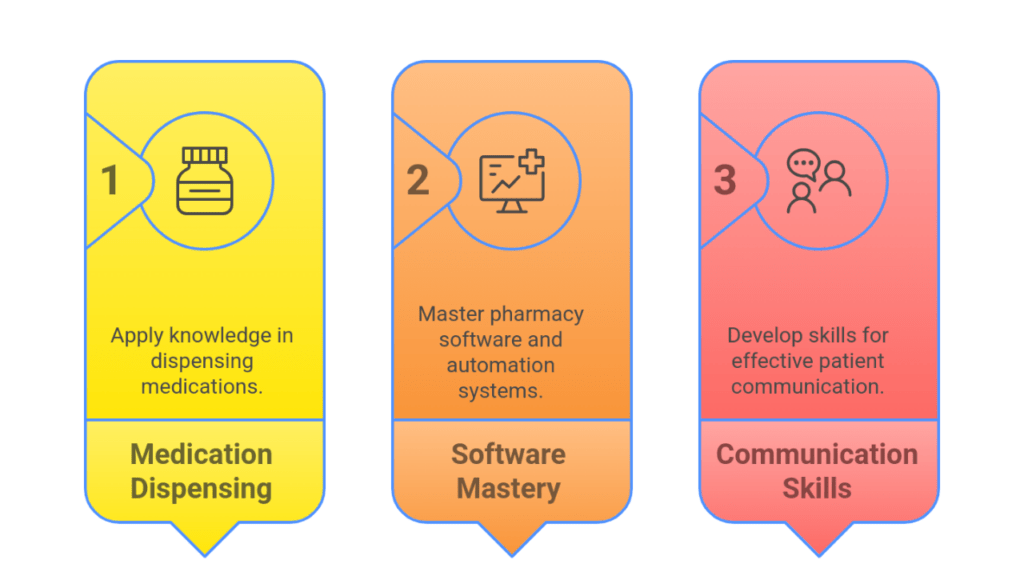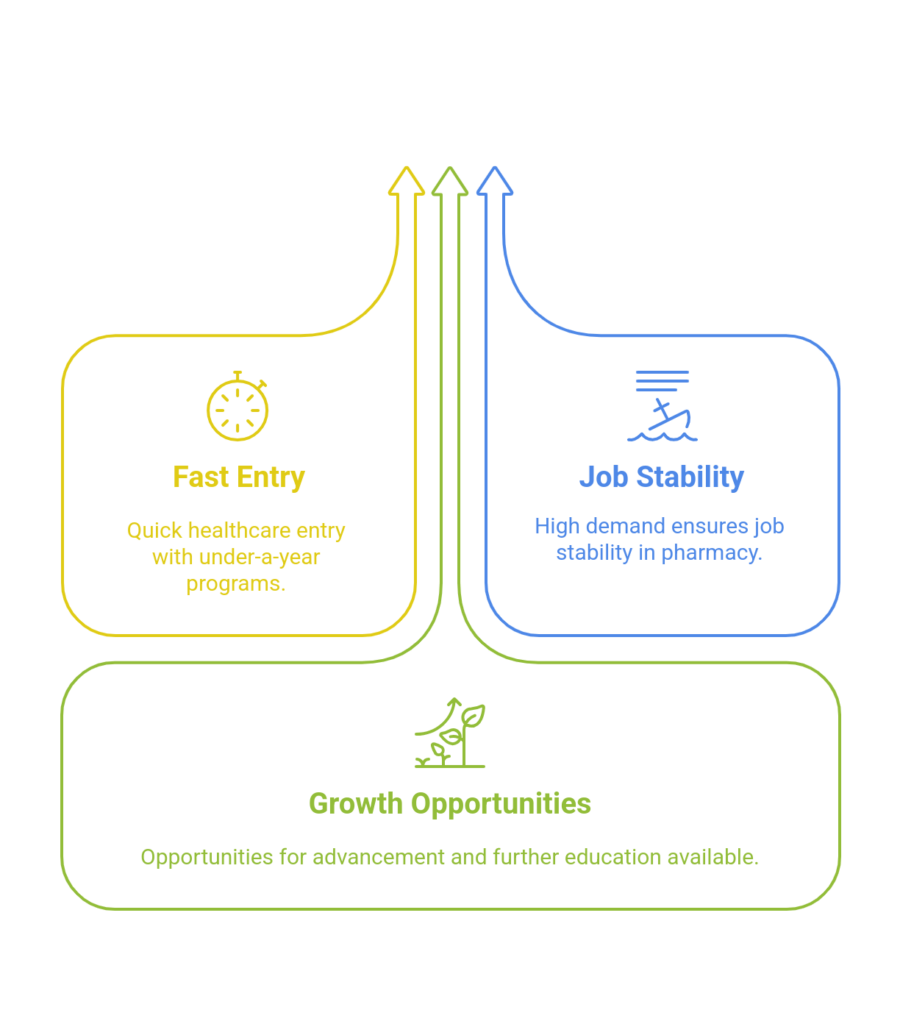
The health sector has gone through a digital transformation due to technical advancements in the medical field. It has paved the way for different kinds of jobs in the medical field. One such opportunity is “Pharmacy Technician.”
“The good physician treats the disease; the great physician treats the patient who has the disease.” – William Osler
As per the U.S. Bureau of Labor Statistics (BLS), there is a projected growth of 7% for pharmacy technicians employment for 2023-2023. This is much higher than the average of other medical occupations.
The profession’s scope makes it an excellent choice in the healthcare industry. But the question remains: How do you become a professional pharmacy technician? What are their key responsibilities and duties?
The objective of this blog is to provide a detailed step-by-step process to become a professional pharmacy technician.
Duties Of a Pharmacy Technician: An Overview
The need for professional pharmacists is everywhere – from hospitals to healthcare facilities. Their presence is met with the performance of some essential tasks.
Here is the list of Pharmacy tech duties:
These responsibilities ensure a healthy medical setting for a better patient outcome.
How To Become A Pharmacy Technician: A Step-by-Step Process
The steps taken in the right direction with proper guidance are the best way to be a professional healthcare provider. Correct education, i.e., programs and courses, hands-on training, and required certifications for applying for a license (practice) and getting better job opportunities will keep your professional medical career on the right track.
Let’s understand each step in detail:
01. GED/ Equivalent Degree
Getting a high school diploma or GED is always the first requirement. Strong foundations are built by the courses in chemistry, biology, and anatomy and develop an understanding of drug interactions and medical terminologies.
The initial courses also familiarize one with handling measurements, as it still remains one of the most performed tasks in entry-level pharmacist jobs.
02. Pharmacy Technician Training Program
After completing formal education, enrolling in an accredited program is a step in the right direction.
One should have a GED or high school diploma or equivalent education to enroll in these programs.
These programs are curated with specific courses such as fundamentals of pharmacy, pharmacology, inventory and insurance, etc.
The courses cover detail topics of:
- Pharmaceutical calculations (dosages, conversions)
- Drug classifications & pharmacology
- Pharmacy law & ethics
- Sterile & non-sterile compounding
- Insurance billing & inventory management
Hands-on labs and simulations ensure that students gain practical skills before entering the workforce. Some states in the US also provide OJT (on-the-job training), as this improves students’ job prospects. Many of these programs are also available in online and hybrid modes.
03. Hands-On-Training & Experience
A good training program also includes externships and training in medical facilities for students near their location in case of online programs. The real-world experience gained after clinical rotations in hospitals and retail pharmacies helps students in:
| NOTE: Some states (like California) require certain training hours before certification. |
04. Certifications
Having certifications is not mandatory, but it sure enhances employment chances and getting a good salary.
There are two primary exams:
- PTCE (Pharmacy Technician Certification Exam), conducted by the PTCB
- ExCPT (Exam for the Certification of Pharmacy Technicians), conducted by NHA
These tests are crucial to assess the student’s knowledge of:
- Pharmacy operations
- Medication safety
- Federal regulations
ADVICE: Certified techs must complete continuing education (CE) to maintain their credentials.
05. Applying for State License to Practice
After certification, getting a license for the medical practice is a must. The requirements vary from state to state.
Example – Texas and Florida have mandated registration with the state board of pharmacy.
This includes:
- Background checks
- Application fees
- Proof of education/externship hours
- Hospital roles often require additional clearances (e.g., vaccinations, drug screenings).
Why Choose a Career as a Pharmacy Technician?
Pharmaceutical Technician Salary & Career Growth
Since there is a rise in the demand for pharmacy technicians in the healthcare industry, the chances of growth are exponential. The factors responsible for the growth include:
- Aging population
- Increased demand for prescription medications
- Expanding healthcare services
As per the data of the U.S. Bureau of Labor Statistics (BLS) in 2023;
Pharmacy Technician Median Pay – $40,300 per year / $19.37 per hour
Additional training in specialized areas such as nuclear pharmacy, compounding, and chemotherapy can lead to much higher earnings.
Conclusion
Having a flourishing medical career is a dream of many. Getting enrolled in a good pharmacy technician program is a step in the right direction. Their demand is on the rise, and in the decade or so, they are going to be one of the central cores of the healthcare industry.
With the right education, hands-on training, and certifications, one can make the dream of becoming a professional pharmacy technician a reality.
Start your journey today with accredited programs and step into this vital medical role.
Program Offered
- Pharmacy Technician Training
- Online Medical Assistant
- Medical Billing and Coding Specialist Program
- Cloud Computing Technician Training
- Computer Network Technician
- Business and Accounting
- Radiology Technician Training
- Medical Assistant Program
- Computer Support Technician
- Cybersecurity Program
- Virtual Assistant Training

This article is written by
Share this article
Program Offered
- Pharmacy Technician Training
- Online Medical Assistant
- Medical Billing and Coding Specialist Program
- Cloud Computing Technician Training
- Computer Network Technician
- Business and Accounting
- Radiology Technician Training
- Medical Assistant Program
- Computer Support Technician
- Cybersecurity Program
- Virtual Assistant Training

This article is written by
Share this article
Related Articles







CCI Training Center Proudly Completes
41 Years in Career Training Services













